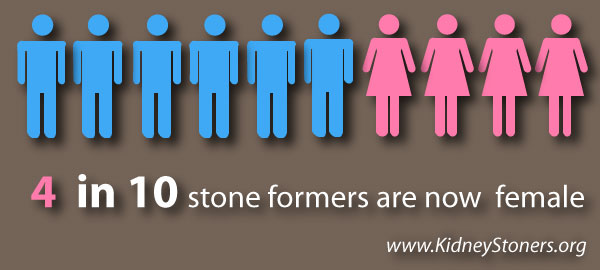Women appear to be at greater risk of forming kidney stones nowadays than ever before in the past. Previously, doctors observed that stones were 3 times more common in men than women (75% versus 25% of stone formers being men or women). Based on data from 2007, that has decreased to stones being only 1.7 times more common in men than women (61% versus 39% of stone formers being men or women).
So how have women almost closed this gender gap and achieved near equal rights to kidney stones? By becoming more like men. While both males and females have become more obese, women are increasing their weight at faster relative rate than men. Because obesity is strongly linked to kidney stone disease, researchers suspect this may be the underlying cause for the shift is stone disease patterns.
Female stone formers have a different distribution in stone types than male stone formers. Women are more likely to get infection related struvite stones because they are more likely to experience urinary tract infections than men. On the other hand, women are less likely to experience uric acid stones than men. This is because gout, which is associated with uric acid stones, is more common in men.
Female stone formers appear to be slightly younger than male stone formers. Female stone formers were on average 52.5 years old versus male stone formers who were 53.6 years old in a recent national survey of kidney stone patients. Female stone formers also appear to experience their first stone episode at an early age than male stone formers.
Women should not restrict their calcium. A common question among female stone formers is whether to stop their calcium supplements. Reducing calcium intake actually will increase the risk of stones in most individuals. Therefore, most female stone formers should maintain a normal calcium intake. Learn more about calcium intake and kidney stones on our separate page “Should I stop my calcium if I have kidney stones?“.
References
Scales et al., Changing Gender Prevalence of Stone Disease, The Journal of Urology, 2007.
Author’s analysis of the National Health and Nutrition Examination Survey, 2007-2008 dataset. Not yet published.

I need some advice, please take the time to read as I need to go in detail… On Dec. 5th I went to the ER due to severe lower back pain on right side & severe bladder pressure w/ trouble urinating. They did CT scan & blood work & said that I indeed have a 2mm stone in ureter & UTI. I have no visible blood when urinating but they said I did have small trace of blood in my urine sample they took.The Dr. told me to drink lots of water & sent me home w/ anti biotics, Flomax, 15 tabs of Percocet’s. She said the stone was pretty far down the ureter so it should pass in 24-48hrs. Well, I went home took all my meds & nothing. Ran out of meds & went back to ER 10days later (Dec. 15th), due to another pain attack! I was scared & wondering why a small 2mm stone hadn’t passed in 10days and I was, by then, outta all my meds. Well, the 2nd ER visit was worst! They kept me there 2days only to pump me full of saline 24/7 (I couldn’t even sleep!) & did nothing! They didn’t even give me pain meds to cope. They also didn’t wanna do another CT scan cause they said they thought it was too soon due to having one 10days prior & it was to close for more radiation exposure. Yea right! So this Dr. sends me home saying it should pass & drink lots of water. He also said he didn’t know why it hadn’t passed yet being only 2mm, yet he sends me home with no meds! Then I find out later that the RN was talking crap to my mom (my mom was my ride home by the way), saying that I shouldn’t be having such severe pain being ONLY a 2mm stone! As if I was lying or some drug seeker making it up. Anyway, it is now Dec 29th & still haven’t passed & still have severe back pain & bladder pressure. I don’t have insurance so I feel this is the reason the ER keeps sending me home cause they know the surgery/removal will be costly. I don’t have insurance or money to see a urologist on my own. My question is why would this stone travel so far down the ureter (close to dropping into bladder) then all of a sudden get stuck? Also note: On Dec 5th was the day I found out I had the stone so I’m not sure HOW LONG before that its been there, for all I know this stone could have been there for weeks or months before they found out on the 5th via CT scan. I didn’t have pain til the 5th when it was discovered. I have been drinking 2liters of water daily & its been 25 days & counting & still hasn’t passed. Is this normal? How long is “too long” for a 2mm stone to pass? & why wont it pass if its only 2mm? I’m so confused & in pain. Can’t even leave my house or do my normal activities cause of pain attacks & being glued to the toilet! I don’t know what to do anymore! – See more at: https://www.kidneystoners.org/faq/comment-page-3/#comment-235123